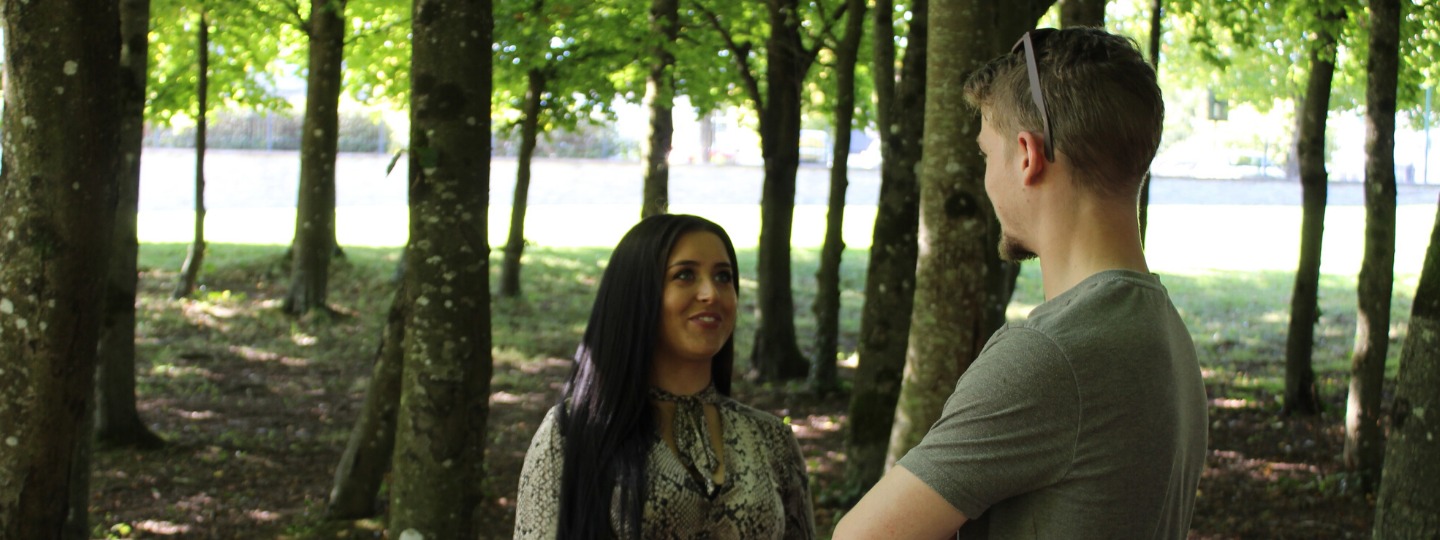Maintaining boundaries
Maintaining boundaries
Tuesday, 14 September 2021
Boundaries demonstrate what we think is acceptable, or unacceptable, in peoples’ behaviour towards us. Establishing boundaries can be a way of protecting ourselves.
To help in this article we cover:
- What are personal boundaries?
- Why are boundaries so important?
- How to create boundaries
- Aisling’s (17) shares her experience of setting boundaries.
The boundary bubble
Think of boundaries as bubbles that protect us. Imagine everyone has an invisible bubble surrounding them. This bubble is our “boundary” both physically and emotionally.
This bubble can act as an invisible barrier to actions or words we don’t want to receive from others. Using our personal values, we get to decide where the line is.
The idea of a bubble can help us respond to negative behaviour or statements from others. We have a choice between letting the remark come in to our bubble, or letting it bounce away.
Overstepping
Sometimes, other people overstep the boundary without our permission. This can happen physically when someone enters our personal space without consent. Or emotionally, when we hear harsh remarks made about us and can’t help but let them sink in.
It’s not your fault if your boundary is broken. The most important thing is to recognise when it happens.
We can then think about ways to deal with the situation. This might include reaching out for support for ourselves.

Why are boundaries so important?
The reality is we can’t control other people’s actions or words. Instead, we can focus on what we can control, which is our response. By working to establish boundaries, we can find our mood less affected by the negative actions or words of others.
When we’re clear about our boundaries, it helps other people understand our expectations for how we want to be treated. In this way, boundaries build lasting and satisfying relationships with friends, family and romantic partners.
How to create boundaries
- Know your values – What are the things that are important to you? For example, if family life is a priority, set boundaries around not working late and protecting this.
- Know your limits – Spend time thinking about your relationships. Decide what you are willing to accept, and what you won’t tolerate. Consider why you make the choices that you do. Your answers will help decide boundaries that meet your own needs.
- Be assertive – Using assertive communication skills can help express what your boundaries are in a direct and open way. Remember, you are not responsible for other people’s feelings or reactions to this. Your needs and feelings matter too.
- Plan your response – Consider what are you going to do if someone breaks a boundary you’ve set. There are lots of responses, depending on the boundary. For example, if you don’t tolerate shouting from others, your response could be walking away when someone raises their voice.
- Practice – If you’re used to accepting all sorts of behaviour from others, it can be tough to break the pattern. Be kind and patient with yourself as you get used to this new way of responding to others. It will take work but it will be worth it.
Changing boundaries
Independence increases slowly but steadily as we grow up. We start to take responsibility for our own safety. We develop our own ideas about what we are, and aren’t, comfortable with.
Parents might have different views about what they consider to be safe or acceptable. This can cause tension and conflict at home.
Understandably, parents can take the approach of “my rules under my roof”. This can restrict the boundaries you want to create for yourself. Making time to negotiate rules and responsibilities with those you live with can prevent these arguments happening.
Using clear and direct communication can make sure that everyone is on the same page.
Respecting boundaries
At some point, you may notice a change in how someone is treating you. Perhaps, they are saying “no” more often, or making decisions based on their own needs. It could be the case they are trying out new boundaries.
Sometimes, this change can make you doubt yourself or the relationship. Try communicating honestly about changes you’ve noticed, and give the person space to try out the boundary. In this way, you can ensure your relationship with them is strengthened, not shaken.
Sexual boundaries
What you are comfortable with when it comes to sex is personal and unique to you. What you like with one person, may not be what you want from another. The reasons for this are many and include trust, mood, and safety.
Your sexual boundaries are fluid and can change as much as you want them to. Everyone should respect each other’s personal boundary, but the reality is that some people don’t. Click here to read more about the communication of, and respect for, sexual boundaries.
Aisling’s story: Being sound to yourself
I’ve always defended my lack of boundaries and people-pleasing as ‘just being sound’. But then I realised I was simultaneously being un-sound to myself.
Difficulty saying no
I offered too much of myself, or went out of my way in situations where I sometimes got little in return. I had a huge problem saying ‘no’, and although I enjoyed pleasing people, it was also really draining. I was always the giver and listener, even if it made me uncomfortable.
I kept trying to please everyone and getting hurt when people wouldn’t return my efforts. It felt like I had to commit to expectations I created, and changing myself for others, which was exhausting.
I worried saying ‘no’ would make me mean or uptight. But it never means you are in the wrong, you are just respecting yourself. It’s also the way you say it- this article was super helpful for me!
In reality, everyone is actually really understanding. It was only in my head that they wouldn’t be.

Taking a step back
Setting boundaries for me involves taking a step back- is this something mutually fair for me and the other person? Will I be short if I take part in this? Or will I genuinely get something out of it?
Knowing exactly what you stand for makes it easier to make these decisions. Although what you feel comfortable doing, can be different in each situation.
I even felt a bit guilty in the short term putting boundaries down. But believe me, you’ll find yourself being a lot happier in the long run!






